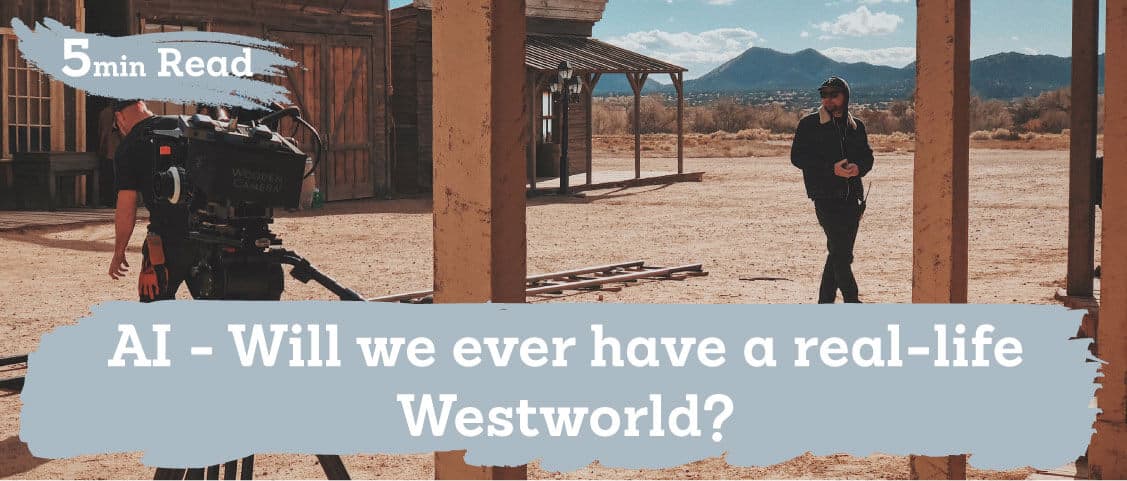AI – Will we ever have a real life Westworld?

Published:
Thanks to great TV like Westworld and Channel Four’s Humans, the concept of the ‘perfect’ humanoid robot rubbing shoulders with humanity no longer seems far-fetched. It’s arguably taken over from other popular AI concepts, such as the robot as a lethal metal monster (like The Terminator) or a super-cute artificial puppy on wheels (like WALL-E for example). But will we ever see humanoid robot colleagues in the office?
Square boxes or skinned robots?
Engineered Arts is a British company making robots for the entertainment industry. ‘We’ve been making humanoids for 15 years now,’ says Engineered Arts founder, Will Jackson. ‘In the last couple of years we’ve started doing skinned robots that are much more realistic. In a nice parallel to the Westworld idea, most of our customers are theme parks. I see the show as quite a nice vision: it’s quite accurate. The sort of thing I don’t believe in is the robot butler idea. Domestic robots will generally be like your washing machine: it’s a square box, it lives under your counter. But where you’ve got human interaction, when people want to interact with other people, then robots do make sense.’
The humanoid robot concept doesn’t seem to bother Will, but some aspects of the tech required to make them a reality do give him second thoughts, like artificial intelligence or AI. ‘The kind of scary AI that we have now is not really in robot form. It’s a web page,” he told The Independent.
Cat or dog?
One of Westworld’s scientific advisers is neuroscientist and writer, David Eagleman, and he his own views about how soon we’ll see humanoid robots in everyday life. ‘It’s really, really distant, AI can do impressive things, like tell the difference between a cat and a dog, or beat a human at chess, but it’s not good at having the broad intelligence that a three year old has.’
But theoretically it should be possible. So how would you make a Westworld robot? On one level it’s fairly straightforward. All you need to do is put lots of different components together, and there’s already a successful human template for this. ‘We’re made up of very sophisticated biological pieces and parts that follow the rules of physics and chemistry,’ David Eagleman explains in a recent NBC video, ‘so it might be possible to do this.’ Creating a complex humanoid robot could be possible then, but building a conscious one is another matter, and there’s a good reason for this: ‘We don’t have any theories on what consciousness is yet,’ David says, ‘we just haven’t figured out all the secrets.’
Truly sentient or just pretending
Futurologist and AI expert Dr Ian Pearson seems to be more optimistic about Westworld robots becoming reality. ‘We’re really starting to catch up with those ideas now in the real world,’ he told the Radio Times. And he has his own thoughts on machine consciousness: ‘It’s a very hot topic in AI circles at the moment, whether or not you could ever make a robot which is as smart as a human being, and whether or not it could ever be truly sentient, and how would you know the difference?’
Dr Pearson advises the James Bond film producers on Q’s arsenal of gadgets, and he thinks popular media and real-world engineering often feed off each in terms of ideas and tech. But like David Eagleman, however, he’s sceptical about humanoid robots arriving in the near future. ‘We’re a long way from making a robot which can run around and be completely convincing in a human way, and we wouldn’t expect to have androids that sophisticated until at least the 2040s or early 2050s.’
Keep an eye out for the red glint…
I wouldn’t argue with experts in this area, but I can’t help wondering if the same things were being said about mobile phone tech twenty years ago, and virtual assistants like Siri and Alex ten years ago. Technological change can be extremely rapid sometimes, so if your next work colleague has an unusual red glint in their eye, just remember where you read it first.
Want to read more TV & film related stuff your boss won’t shout at you for? Check this out!
Author Bio :
Den Cartlidge is a copywriter and aspiring author. He likes herbal tea, swimming in the sea and can advise on the best way to catch a swan.